(英语)否定句的翻译
- 格式:pdf
- 大小:161.09 KB
- 文档页数:4

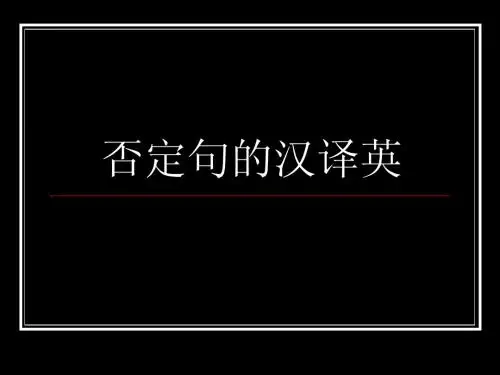

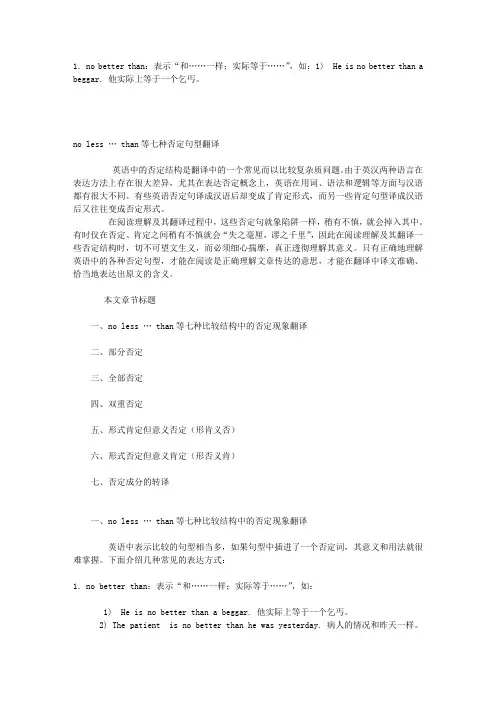
1.no better than:表示“和……一样;实际等于……”,如:1) He is no better than a beggar. 他实际上等于一个乞丐。
no less … than等七种否定句型翻译英语中的否定结构是翻译中的一个常见而以比较复杂质问题。
由于英汉两种语言在表达方法上存在很大差异,尤其在表达否定概念上,英语在用词、语法和逻辑等方面与汉语都有很大不同。
有些英语否定句译成汉语后却变成了肯定形式,而另一些肯定句型译成汉语后又往往变成否定形式。
在阅读理解及其翻译过程中,这些否定句就象陷阱一样,稍有不慎,就会掉入其中。
有时仅在否定、肯定之间稍有不慎就会“失之毫厘,谬之千里”,因此在阅读理解及其翻译一些否定结构时,切不可望文生义,而必须细心揣摩,真正透彻理解其意义。
只有正确地理解英语中的各种否定句型,才能在阅读是正确理解文章传达的意思,才能在翻译中译文准确、恰当地表达出原文的含义。
本文章节标题一、no less … than等七种比较结构中的否定现象翻译二、部分否定三、全部否定四、双重否定五、形式肯定但意义否定(形肯义否)六、形式否定但意义肯定(形否义肯)七、否定成分的转译一、no less … than等七种比较结构中的否定现象翻译英语中表示比较的句型相当多,如果句型中插进了一个否定词,其意义和用法就很难掌握。
下面介绍几种常见的表达方式:1.no better than:表示“和……一样;实际等于……”,如:1) He is no better than a beggar. 他实际上等于一个乞丐。
2) The patient is no better than he was yesterday. 病人的情况和昨天一样。
3) He has no better a say in the matter than I have.他和我一样在这件事上没有发言权。
2.not. . . any more than或no more. . . than:表示“同……一样不”,如:1) I could no more do that than you. I could not do that any more than you. 你不能做这件事,我也不能做。
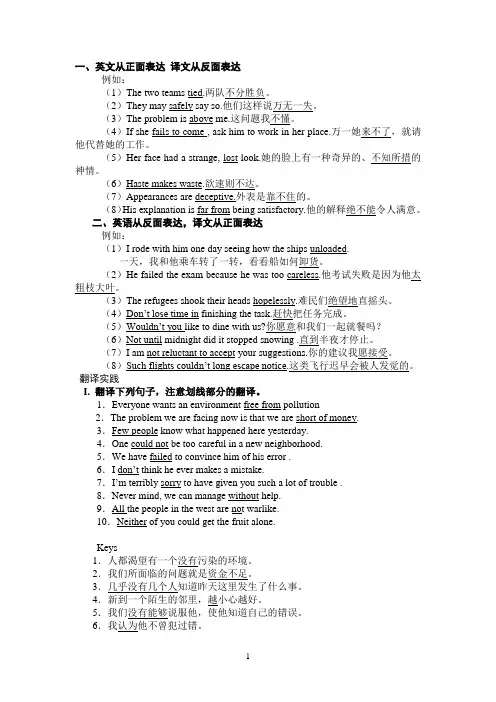
一、英文从正面表达译文从反面表达例如:(1)The two teams tied.两队不分胜负。
(2)They may safely say so.他们这样说万无一失。
(3)The problem is above me.这问题我不懂。
(4)If she fails to come , ask him to work in her place.万一她来不了,就请他代替她的工作。
(5)Her face had a strange, lost look.她的脸上有一种奇异的、不知所措的神情。
(6)Haste makes waste.欲速则不达。
(7)Appearances are deceptive.外表是靠不住的。
(8)His explanation is far from being satisfactory.他的解释绝不能令人满意。
二、英语从反面表达,译文从正面表达例如:(1)I rode with him one day seeing how the ships unloaded.一天,我和他乘车转了一转,看看船如何卸货。
(2)He failed the exam because he was too careless.他考试失败是因为他太粗枝大叶。
(3)The refugees shook their heads hopelessly.难民们绝望地直摇头。
(4)Don’t lose time in finishing the task.赶快把任务完成。
(5)Wouldn’t you like to dine with us?你愿意和我们一起就餐吗?(6)Not until midnight did it stopped snowing .直到半夜才停止。
(7)I am not reluctant to accept your suggestions.你的建议我愿接受。
(8)Such flights couldn’t long escape notice.这类飞行迟早会被人发觉的。
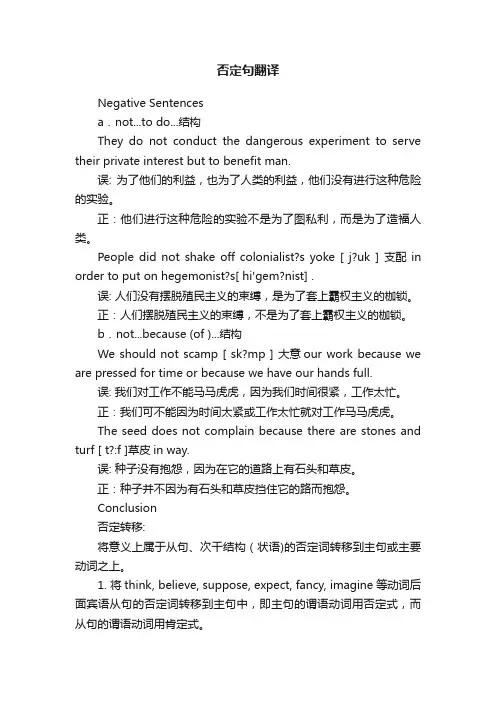
否定句翻译Negative Sentencesa.not...to do...结构They do not conduct the dangerous experiment to serve their private interest but to benefit man.误: 为了他们的利益,也为了人类的利益,他们没有进行这种危险的实验。
正:他们进行这种危险的实验不是为了图私利,而是为了造福人类。
People did not shake off colonialist?s yoke [ j?uk ] 支配in order to put on hegemonist?s[ hi'gem?nist] .误: 人们没有摆脱殖民主义的束缚,是为了套上霸权主义的枷锁。
正:人们摆脱殖民主义的束缚,不是为了套上霸权主义的枷锁。
b.not...because (of )...结构We should not scamp [ sk?mp ] 大意our work because we are pressed for time or because we have our hands full.误: 我们对工作不能马马虎虎,因为我们时间很紧,工作太忙。
正:我们可不能因为时间太紧或工作太忙就对工作马马虎虎。
The seed does not complain because there are stones and turf [ t?:f ]草皮in way.误: 种子没有抱怨,因为在它的道路上有石头和草皮。
正:种子并不因为有石头和草皮挡住它的路而抱怨。
Conclusion否定转移:将意义上属于从句、次干结构(状语)的否定词转移到主句或主要动词之上。
1. 将think, believe, suppose, expect, fancy, imagine等动词后面宾语从句的否定词转移到主句中,即主句的谓语动词用否定式,而从句的谓语动词用肯定式。

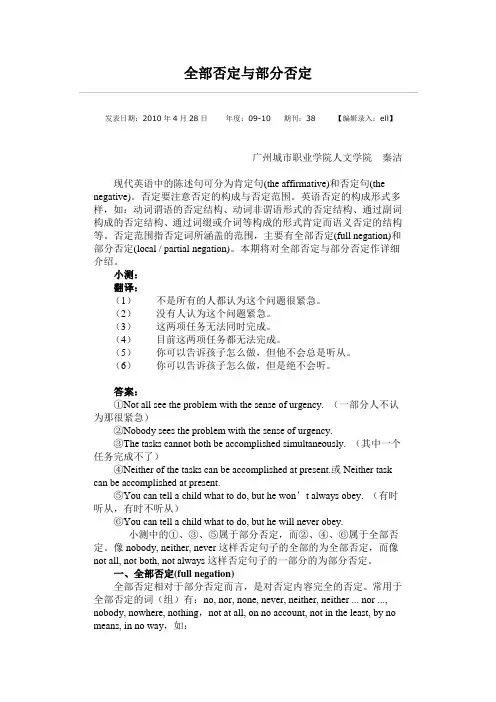
全部否定与部分否定发表日期:2010年4月28日年度:09-10 期刊:38 【编辑录入:ell】广州城市职业学院人文学院秦洁现代英语中的陈述句可分为肯定句(the affirmative)和否定句(the negative)。
否定要注意否定的构成与否定范围。
英语否定的构成形式多样,如:动词谓语的否定结构、动词非谓语形式的否定结构、通过副词构成的否定结构、通过词缀或介词等构成的形式肯定而语义否定的结构等。
否定范围指否定词所涵盖的范围,主要有全部否定(full negation)和部分否定(local / partial negation)。
本期将对全部否定与部分否定作详细介绍。
小测:翻译:(1)不是所有的人都认为这个问题很紧急。
(2)没有人认为这个问题紧急。
(3)这两项任务无法同时完成。
(4)目前这两项任务都无法完成。
(5)你可以告诉孩子怎么做,但他不会总是听从。
(6)你可以告诉孩子怎么做,但是绝不会听。
答案:①Not all see the problem with the sense of urgency. (一部分人不认为那很紧急)②Nobody sees the problem with the sense of urgency.③The tasks cannot both be accomplished simultaneously. (其中一个任务完成不了)④Neither of the tasks can be accomplished at present.或Neither task can be accomplished at present.⑤You can tell a child what to do, but he won’t always obey. (有时听从,有时不听从)⑥You can tell a child what to do, but he will never obey.小测中的①、③、⑤属于部分否定,而②、④、⑥属于全部否定。
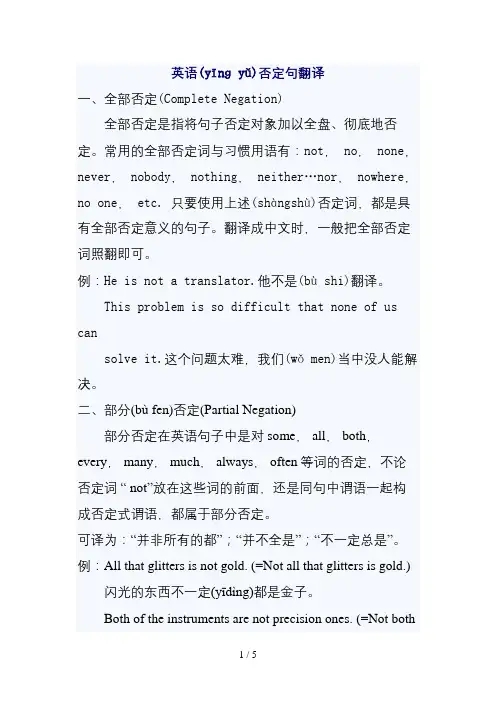
英语(yīnɡ yǔ)否定句翻译一、全部否定(Complete Negation)全部否定是指将句子否定对象加以全盘、彻底地否定。
常用的全部否定词与习惯用语有:not, no, none,never, nobody, nothing,neither…nor, nowhere,no one, etc. 只要使用上述(shàngshù)否定词,都是具有全部否定意义的句子。
翻译成中文时,一般把全部否定词照翻即可。
例:He is not a translator.他不是(bù shi)翻译。
This problem is so difficult that none of us cansolve it.这个问题太难,我们(wǒ men)当中没人能解决。
二、部分(bù fen)否定(Partial Negation)部分否定在英语句子中是对some, all, both,every, many, much, always, often等词的否定,不论否定词“ not”放在这些词的前面,还是同句中谓语一起构成否定式谓语,都属于部分否定。
可译为:“并非所有的都”;“并不全是”;“不一定总是”。
例:All that glitters is not gold. (=Not all that glitters is gold.) 闪光的东西不一定(yīdìng)都是金子。
Both of the instruments are not precision ones. (=Not bothof the instruments are precision ones.)这两台仪器(yíqì)并不都是精密仪器。
从以上两例可看出,not every=some, not both=one, not always=sometimes,not wholly=in some degree not together=somewhat.三、双重否定(Double Negation)双重否定是指两个否定词并用,否定同一个单词,或者一个否定词否定另一个否定词,其否定意义互相抵消得到肯定意义。

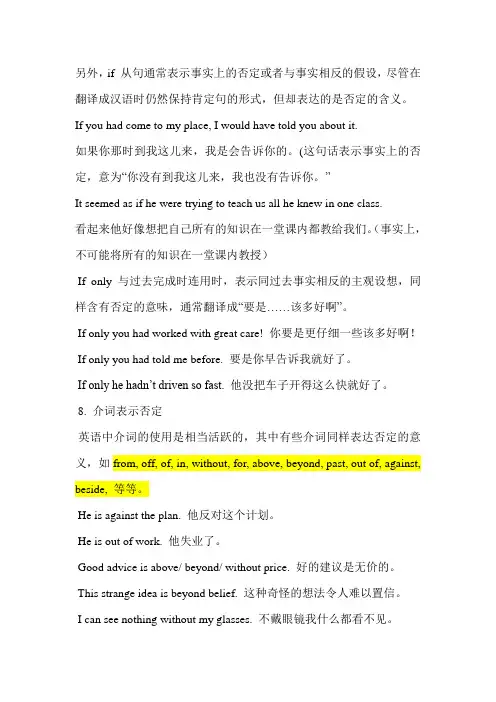
另外,if 从句通常表示事实上的否定或者与事实相反的假设,尽管在翻译成汉语时仍然保持肯定句的形式,但却表达的是否定的含义。
If you had come to my place, I would have told you about it.如果你那时到我这儿来,我是会告诉你的。
(这句话表示事实上的否定,意为“你没有到我这儿来,我也没有告诉你。
”It seemed as if he were trying to teach us all he knew in one class.看起来他好像想把自己所有的知识在一堂课内都教给我们。
(事实上,不可能将所有的知识在一堂课内教授)If only 与过去完成时连用时,表示同过去事实相反的主观设想,同样含有否定的意味,通常翻译成“要是……该多好啊”。
If only you had worked with great care! 你要是更仔细一些该多好啊! If only you had told me before. 要是你早告诉我就好了。
If only he hadn’t driven so fast.他没把车子开得这么快就好了。
8. 介词表示否定英语中介词的使用是相当活跃的,其中有些介词同样表达否定的意义,如from, off, of, in, without, for, above, beyond, past, out of, against, beside, 等等。
He is against the plan. 他反对这个计划。
He is out of work. 他失业了。
Good advice is above/ beyond/ without price. 好的建议是无价的。
This strange idea is beyond belief. 这种奇怪的想法令人难以置信。
I can see nothing without my glasses. 不戴眼镜我什么都看不见。
❝ 1. T om is not altogether satisfied with the result of the experiment.汤姆并不完全满意实验结果。
❝ 2. T om is not satisfied with result of the experiment.汤姆不满意实验结果。
❝ 3. T om is not satisfied with the result of the experiment at all.汤姆一点都不满意实验结果。
❝ 4. He did not speak clearly and correctly.他不能既讲得清楚又讲得正确。
❝ 5. Without numbers, we couldn’t build houses or cities, or make cars or ships.没有数字,我们既不能建造房子和城市,也不能制造汽车和轮船。
❝ 6. It is a wise father that knows his own child.再聪明的父亲也未必了解自己的孩子。
❝7. He has no reason to think less of himself because he is not dressed in a rich and fashionable manner.他没有理由看不起自己,虽然他没有华丽时尚的仪表。
❝8. Don’t be vain because you are good-looking.不要徒自伤悲,因为你是悦目的。
❝9. he does not work hard because he wants to earn more.❝他很用功,因为他想赚更多的钱。
❝10. she did not cry because she failed in the exam.她并没有因为考试不及格而哭泣。
❝11. I didn’t go out for walk, because it rained.我并没有因为下雨就没有去散步。
2013-03-26 11:00:14 来源:爱词霸编辑:zhouzhichao 点击:2307次英语否定句及其翻译意思否定的肯定句英语中有许多句子,形式上是肯定的,但是其意思却是否定的,这是因为英语中有许多表示否定意思的词和词组。
首先一类是所谓“准否定词,包括few, little, hardly, rarely, scarcely, barely, seldom:Few people have ever seen him get out of that house. 几乎没什么人看见他从那间屋子里出来过。
He has seen little of life.。
他不懂什么世故(没有见过什么世面)。
I can hardly read the original without a dictionary. 不借助于词典我简直看不懂原著。
People rarely see this kind of plant in blossom. 人们很少见到过(几乎没有见到过)这种植物开花。
We scarcely ever need it; take it away.我们极难得需要它(几乎用不着它);把它拿走。
需要注意的是,英语里一般都用这类“准否定词”表示“几乎不”的意思,而不说almost not.其次,英语中有许多动词含有否定的意思。
请看下列例句:The door simply refused to open.门根本就打不开。
The error of calculation escaped the accountant. 会计没有注意到这一计算错误。
He ignored the whole speech of the schoolmaster. 他根本就没有听校长的讲话。
The boy tried by every means to avoid being caught by his father. 那孩子想方设法不让父亲逮住他。
英语翻译技巧否定的翻译一部分否定和全部否定1.部分否定当not出现在含有表示全部肯定的不定代词all,every-,both等时,不管是之前还是之后,即表示整体中的一部分被否定。
译为“并非一切⋯⋯都”或“并非都是”1三者或三者以上的部分否定,当not出现在含有表示全部肯定的不定代词——al1,every,everyone,everybody,everything的句子中如:Not all birds can fly./All birds can’t fly.不是所有的鸟儿都能飞。
Not everyone thinks that the government is being particularly generous.并非所有人都认为政府特别慷慨。
All his haste was of no use.他白忙了。
总括性副词everywhere,wholly完全地,全部,统统,always,altogether etc.这些词和not连用时也表示部分否定。
Acid rain is not straightforwardly1 attributable to the burning of coal.酸雨并非简单地由烧煤造成。
2两者的部分否定——由not 和both组成Not both the artists have a keen eye for beauty. =both of the artists don’’t have a keen eye for beauty.这两位艺术家并非都有审美的眼光.一定要记住是“并非都”,很容易出错的!2. 全部否定1英语中表示三者以上的“全不”时,常用否定词语no one,none,nothing,nobody,never,nowhere,not⋯any以及no+名词等,表示全部否定。
No one knew how to treat this dreaded2 disease.没人知道如何治疗这种可怕的疾病。